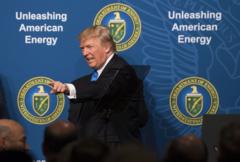President Trump's commitment to increasing fossil fuel production is prompting other nations to reconsider their climate strategies, diminishing momentum for clean energy initiatives worldwide. Developing countries are questioning the fairness of climate expectations while large emitters like the U.S. ramp up oil and gas extraction, potentially jeopardizing global climate goals.
Trump’s Oil Pledges Reshape Global Energy Policies

Trump’s Oil Pledges Reshape Global Energy Policies
The influence of the U.S. fossil fuel agenda under President Trump raises concerns among nations striving for climate commitments.
The recent UN climate summit held in the United Arab Emirates in 2023 was celebrated as a pivotal moment in the fight against climate change, with a strong emphasis on moving away from fossil fuels. However, recent developments raise alarm as momentum appears to be stalling in the global commitment to tackle climate change. U.S. President Donald Trump’s approach, encapsulated in the slogan "drill, baby, drill," embraces the fossil fuel industry, which is influencing policies in other countries and the direction of global energy companies.
Countries like Indonesia are now voicing doubts about their obligations to adhere to international agreements when the U.S. takes a step back. Hashim Djojohadikusumo, Indonesia's special envoy for climate change and energy, highlighted the perceived injustice in expecting lower-emitting countries to cut back on fossil fuels while the U.S., the world's top oil producer, continues to expand its output. For years, Indonesia has ranked among the top ten carbon-emitting nations, touting a significantly lower per capita carbon output than the U.S. Yet, they face pressure to transition away from fossil fuels while the U.S. leads a contrasting approach.
South Africa, similarly influenced by U.S. energy policies, is encountering delays in its $8.5 billion transition project from coal as concerns mount over the shifting focus back to fossil fuels. Wikus Kruger from the University of Cape Town commented on the potential slow-down of renewable energy projects, although such transitions are still anticipated to persist amid the ongoing discussions.
The trend is not isolated. Since Trump’s presidency, countries like Argentina have indicated intentions to withdraw from the Paris Agreement, asserting a newfound confidence in expanding their own oil and gas production. Enrique Viale of the Argentine Association of Environmental Lawyers echoed this sentiment, fretting over the implications of the U.S.’s stance.
Even energy giants are shifting strategies to echo this narrative. Equinor recently announced plans to cut back on investments in renewable initiatives while boosting oil and gas production. BP is also expected to follow suit, reflecting the broader trend where companies reassess priorities in light of the growing fossil fuel commitment from the U.S.
President Trump's declaration of American energy ambitions goes beyond domestic confines, with indications that foreign markets are also increasing their reliance on U.S. fossil fuels. Following negotiations following Trump's inauguration, India agreed to ramp up imports of American oil and gas, while other countries such as South Korea and Japan are echoed similar intentions.
Critics warn that the U.S.'s aggressive pursuit of fossil fuel extraction could slow down the global transition to clean energy, potentially stunting the progress made thus far. As scientists advocate for urgent reductions in carbon emissions to limit global warming, there remains a consensus that substantial fossil fuel exploitation directly contradicts these targets.
In summary, the ramifications of Trump’s fossil fuel policies are notable not just for the U.S., but for the wider global commitment to sustainable energy. The dialogue among developing nations and the strategies of major corporations all illustrate a consequential pivot that poses significant risks to the direction of international climate agreements and the urgent need for energy transition.





















